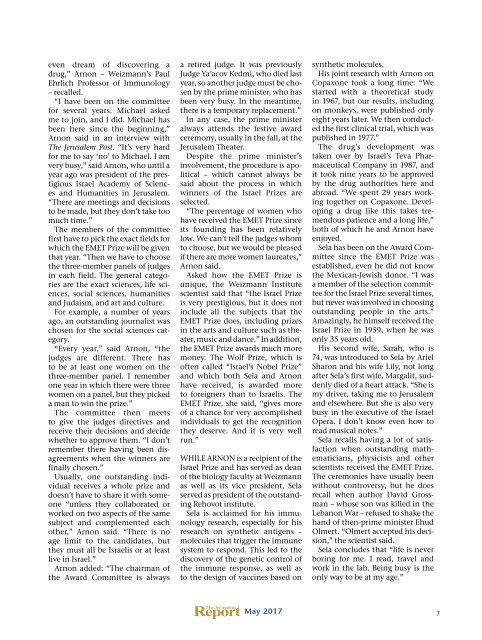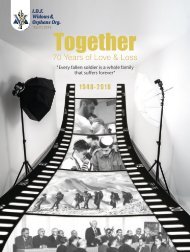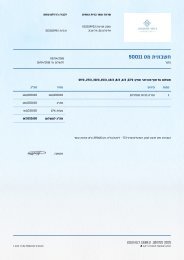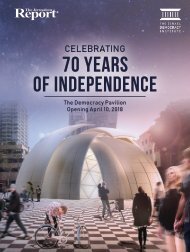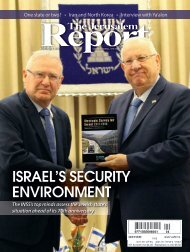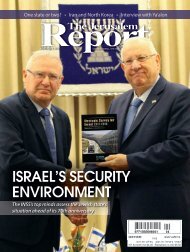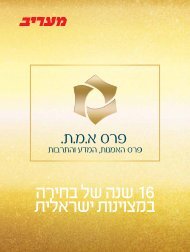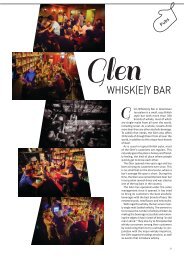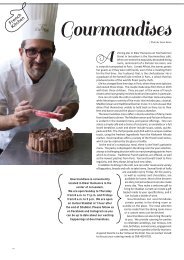Create successful ePaper yourself
Turn your PDF publications into a flip-book with our unique Google optimized e-Paper software.
even dream of discovering a<br />
drug,” Arnon – Weizmann’s Paul<br />
Ehrlich Professor of Immunology<br />
– recalled.<br />
“I have been on the committee<br />
for several years. Michael asked<br />
me to join, and I did. Michael has<br />
been here since the beginning,”<br />
Arnon said in an interview with<br />
The Jerusalem Post. “It’s very hard<br />
for me to say ‘no’ to Michael. I am<br />
very busy,” said Arnon, who until a<br />
year ago was president of the prestigious<br />
Israel Academy of Sciences<br />
and Humanities in Jerusalem.<br />
“There are meetings and decisions<br />
to be made, but they don’t take too<br />
much time.”<br />
The members of the committee<br />
first have to pick the exact fields for<br />
which the <strong>EMET</strong> Prize will be given<br />
that year. “Then we have to choose<br />
the three-member panels of judges<br />
in each field. The general categories<br />
are the exact sciences, life sciences,<br />
social sciences, humanities<br />
and Judaism, and art and culture.<br />
For example, a number of years<br />
ago, an outstanding journalist was<br />
chosen for the social sciences category.<br />
“Every year,” said Arnon, “the<br />
judges are different. There has<br />
to be at least one women on the<br />
three-member panel. I remember<br />
one year in which there were three<br />
women on a panel, but they picked<br />
a man to win the prize.”<br />
The committee then meets<br />
to give the judges directives and<br />
receive their decisions and decide<br />
whether to approve them. “I don’t<br />
remember there having been disagreements<br />
when the winners are<br />
finally chosen.”<br />
Usually, one outstanding individual<br />
receives a whole prize and<br />
doesn’t have to share it with someone<br />
“unless they collaborated or<br />
worked on two aspects of the same<br />
subject and complemented each<br />
other,” Arnon said. “There is no<br />
age limit to the candidates, but<br />
they must all be Israelis or at least<br />
live in Israel.”<br />
Arnon added: “The chairman of<br />
the Award Committee is always<br />
a retired judge. It was previously<br />
Judge Ya’acov Kedmi, who died last<br />
year, so another judge must be chosen<br />
by the prime minister, who has<br />
been very busy. In the meantime,<br />
there is a temporary replacement.”<br />
In any case, the prime minister<br />
always attends the festive award<br />
ceremony, usually in the fall, at the<br />
Jerusalem Theater.<br />
Despite the prime minister’s<br />
involvement, the procedure is apolitical<br />
– which cannot always be<br />
said about the process in which<br />
winners of the Israel Prizes are<br />
selected.<br />
“The percentage of women who<br />
have received the <strong>EMET</strong> Prize since<br />
its founding has been relatively<br />
low. We can’t tell the judges whom<br />
to choose, but we would be pleased<br />
if there are more women laureates,”<br />
Arnon said.<br />
Asked how the <strong>EMET</strong> Prize is<br />
unique, the Weizmann Institute<br />
scientist said that “the Israel Prize<br />
is very prestigious, but it does not<br />
include all the subjects that the<br />
<strong>EMET</strong> Prize does, including prizes<br />
in the arts and culture such as theater,<br />
music and dance.” In addition,<br />
the <strong>EMET</strong> Prize awards much more<br />
money. The Wolf Prize, which is<br />
often called “Israel’s Nobel Prize”<br />
and which both Sela and Arnon<br />
have received, is awarded more<br />
to foreigners than to Israelis. The<br />
<strong>EMET</strong> Prize, she said, “gives more<br />
of a chance for very accomplished<br />
individuals to get the recognition<br />
they deserve. And it is very well<br />
run.”<br />
WHILE ARNON is a recipient of the<br />
Israel Prize and has served as dean<br />
of the biology faculty at Weizmann<br />
as well as its vice president, Sela<br />
served as president of the outstanding<br />
Rehovot institute.<br />
Sela is acclaimed for his immunology<br />
research, especially for his<br />
research on synthetic antigens –<br />
molecules that trigger the immune<br />
system to respond. This led to the<br />
discovery of the genetic control of<br />
the immune response, as well as<br />
to the design of vaccines based on<br />
synthetic molecules.<br />
His joint research with Arnon on<br />
Copaxone took a long time: “We<br />
started with a theoretical study<br />
in 1967, but our results, including<br />
on monkeys, were published only<br />
eight years later. We then conducted<br />
the first clinical trial, which was<br />
published in 1977.”<br />
The drug’s development was<br />
taken over by Israel’s Teva Pharmaceutical<br />
Company in 1987, and<br />
it took nine years to be approved<br />
by the drug authorities here and<br />
abroad. “We spent 29 years working<br />
together on Copaxone. Developing<br />
a drug like this takes tremendous<br />
patience and a long life,”<br />
both of which he and Arnon have<br />
enjoyed.<br />
Sela has been on the Award Committee<br />
since the <strong>EMET</strong> Prize was<br />
established, even he did not know<br />
the Mexican-Jewish donor. “I was<br />
a member of the selection committee<br />
for the Israel Prize several times,<br />
but never was involved in choosing<br />
outstanding people in the arts.”<br />
Amazingly, he himself received the<br />
Israel Prize in 1959, when he was<br />
only 35 years old.<br />
His second wife, Sarah, who is<br />
74, was introduced to Sela by Ariel<br />
Sharon and his wife Lily, not long<br />
after Sela’s first wife, Margalit, suddenly<br />
died of a heart attack. “She is<br />
my driver, taking me to Jerusalem<br />
and elsewhere. But she is also very<br />
busy in the executive of the Israel<br />
Opera. I don’t know even how to<br />
read musical notes.”<br />
Sela recalls having a lot of satisfaction<br />
when outstanding mathematicians,<br />
physicists and other<br />
scientists received the <strong>EMET</strong> Prize.<br />
The ceremonies have usually been<br />
without controversy, but he does<br />
recall when author David Grossman<br />
– whose son was killed in the<br />
Lebanon War – refused to shake the<br />
hand of then-prime minister Ehud<br />
Olmert. “Olmert accepted his decision,”<br />
the scientist said.<br />
Sela concludes that “life is never<br />
boring for me. I read, travel and<br />
work in the lab. Being busy is the<br />
only way to be at my age.”<br />
The Jerusalem<br />
Report<br />
May <strong>2017</strong><br />
7


